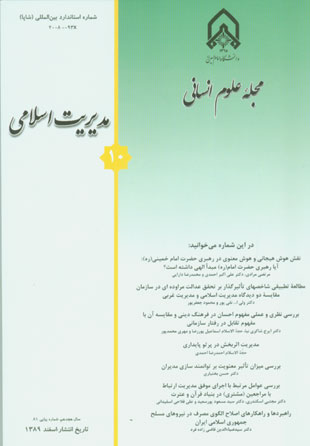An Analysis of the Thoughts of Alfarabius and Rorty
Author(s):
Abstract:
As the issue of education is complicated and multidimensional, it seems necessary to review the thoughts of different scholars in this discipline, and to compare them in order to make better use of their ideas. Using analyticdocumentary method, the researchers intended to compare the ideas of Alfarabius, the Islamic scholar, and those of Rorty, a neo-pragmatist scholar. A considerable point is that, both of these scholars have presented important and valuable reflections on ideal society and anthropology, which have resulted in outstanding outcomes for education. In this piece of research, firstthe thoughts of Alfarabius on the issues of anthropology, education, and their attitude towards society were compared. Then, having explained their ideas on these three points, the researchers tried to analyze them carefully. The main purpose of this study was to find out the similarities and differences between the thoughts of these two scholars. The result indicated that both of these scholars considered social education as a significant issue. Moreover, both emphasized on man’s self-making and his role as agency in education. They also shared the same idea about esthetic approaches to teaching.
Language:
Persian
Published:
Journal of Human Science, Volume:18 Issue: 80, 2011
Page:
55
magiran.com/p850964
دانلود و مطالعه متن این مقاله با یکی از روشهای زیر امکان پذیر است:
اشتراک شخصی
با عضویت و پرداخت آنلاین حق اشتراک یکساله به مبلغ 1,390,000ريال میتوانید 70 عنوان مطلب دانلود کنید!
اشتراک سازمانی
به کتابخانه دانشگاه یا محل کار خود پیشنهاد کنید تا اشتراک سازمانی این پایگاه را برای دسترسی نامحدود همه کاربران به متن مطالب تهیه نمایند!
توجه!
- حق عضویت دریافتی صرف حمایت از نشریات عضو و نگهداری، تکمیل و توسعه مگیران میشود.
- پرداخت حق اشتراک و دانلود مقالات اجازه بازنشر آن در سایر رسانههای چاپی و دیجیتال را به کاربر نمیدهد.
In order to view content subscription is required
Personal subscription
Subscribe magiran.com for 70 € euros via PayPal and download 70 articles during a year.
Organization subscription
Please contact us to subscribe your university or library for unlimited access!



